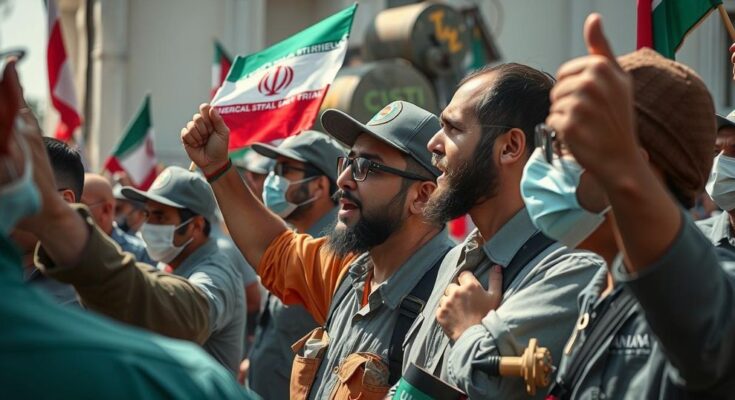On January 13, Iranian labor organizations and retirees condemned the regime’s anti-labor policies, describing the wage conditions as detrimental to the working class. With wages failing to meet living costs amid soaring inflation, recent proposals for wage increases are deemed insufficient. Activists urge collaboration among societal groups to challenge these policies, evident in the rising protests despite government crackdowns. This movement indicates a critical moment in Iran’s economic and social framework, necessitating urgent reforms to alleviate pressures on the working class.
On January 13, a coalition of labor organizations and retirees in Iran publicly denounced the regime’s anti-labor policies, asserting that these measures have marginalized both workers and wage earners throughout the nation. In their statement, the groups condemned the government’s “wrong and anti-labor policies in all fields,” cautioning that without intervention, the working class would face an escalating crisis and deteriorating conditions.
The joint statement, endorsed by significant organizations such as the Haftapeh Sugar Cane Workers Union and the Coordinating Committee to Help Establish Labor Organizations, underscored the pivotal role of the working class in the nation’s economy, declaring, “the wheels of the economy move with this labor power.” They emphasized that workers, as the primary wealth producers, are burdened during a period marked by slim wage growth and high inflation.
Criticism of the government’s wage policies was significant, with signatories asserting that wages have descended to levels “worse than in previous years.” As inflation escalates, they warned that the suppression of wages will draw society closer to a critical tipping point. Currently, it is revealed that the minimum wage for workers, approximately 11 million tomans per month, fails to meet the rising cost of living, which many estimate to be significantly higher at around 40 to 45 million tomans for a family of four.
Omid Nasibi, a member of Iran’s Parliament, acknowledged the severity of the challenges facing workers, stating, “In the current inflationary conditions, the working class is unable to meet the cost of housing rent and livelihood. They are facing serious problems.” The government’s proposal for a 20% wage increase next year, alongside potential 30% adjustments for workers, is deemed inadequate by the labor organizations amid forecasts predicting a further rise in living costs in the following years.
Iranian workers are among the lowest paid in the region, a situation made more dire by soaring inflation and the increasing living costs. The collective statement highlighted the government’s failure to address these inequities and called for solidarity among various oppressed groups—including teachers, retirees, youth, women, farmers, and medical personnel—to oppose the detrimental policies rolled out by the regime.
As dissatisfaction intensifies among workers, teachers, and pensioners, recent years have witnessed a surging wave of protests aiming to advocate for fair wages and enhanced working conditions. However, the regime has responded harshly, employing security forces to suppress demonstrators. Despite these measures, activists maintain that the government’s oppressive tactics have not stifled the grievances of the working class.
The recent statement from labor organizations represents an urgent call for collective action as Iran’s economic crisis deepens. The disparity between stagnant wages and surging living costs catalyzes a growing movement, expressive of both economic hardship and a repudiation of policies restricting workers’ rights. Without substantial reform, there exists a risk that the fundamental structure of the country’s economy may further deteriorate, exacerbating the plight of its labor force.
Iran has been facing a significant economic crisis, characterized by high inflation and increasing living costs that have severely impacted workers’ livelihoods. The Iranian regime’s labor policies have been criticized for failing to protect wages in relation to inflation and the cost of living, leading to widespread unrest among various segments of society. Labor organizations and retirees have begun to unite in vocal opposition to these policies, as they seek to confront the worsening conditions faced by workers, retirees, and other affected groups. This unrest is manifesting in growing protests demanding better working conditions and a more equitable distribution of wealth. The current situation necessitates a closer examination of the economic and social policies in place and their ramifications on the working class.
In summary, the coalition of labor organizations and retirees in Iran has issued a powerful condemnation of the government’s anti-labor policies, highlighting the urgent need for a reevaluation of wage standards in light of inflation. With alarming disparities between wages and the cost of living, the potential for social unrest continues to escalate. The collective call for unity among marginalized classes signifies a pivotal moment in Iran’s socio-economic landscape, suggesting that without meaningful reforms, the grievances of the working class will only intensify, posing a risk to the nation’s economic stability.
Original Source: irannewsupdate.com




